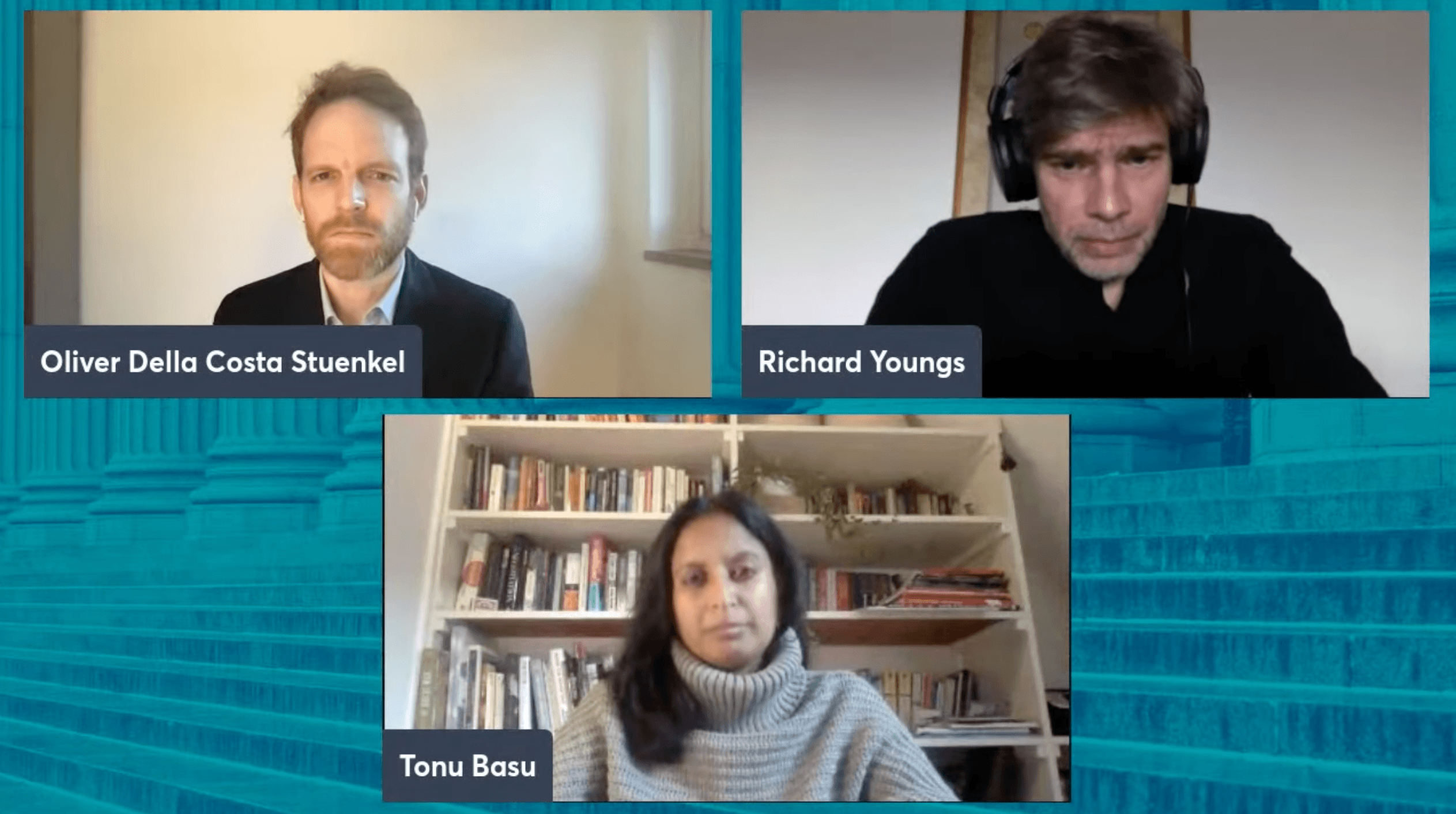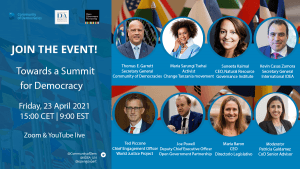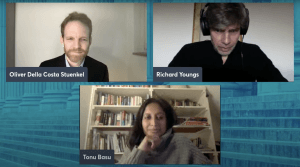Summit For Democracy: From Words to Action
Cumbre por la democracia: Del discurso a la acción
The Democracy Debates is a multi-stakeholder forum for debating policies and politics impacting democracy. Led by the Open Governance Network for Europe in partnership with Carnegie Europe and the European Partnership for Democracy, the Democracy Debates regularly convene European policymakers and politicians with civil society, academics, and philanthropists to debate and discuss ideas for democratic solutions to shared problems facing our democratic values, systems, and societies.
On December 9-10, 2021, U.S. President Joe Biden convened the first of two Summits for Democracy. Leaders from government, civil society, and the private sector agreed to a Year of Action by reviving democracy at home and abroad and advancing democratic reform. But is this Summit capable of tackling democracy’s challenges? To help answer this, the Open Governance Network for Europe, Carnegie Europe, and European Partnership for Democracy convened a Democracy Debate to hear from experts on both sides. Here’s what they said:
Arguing in favor of the Summit’s capability to deliver, Tonu Basu, Deputy Director of Thematic Policy Areas at the Open Government PartnershipThe Open Government Partnership (OGP) is a multi-stakeholder initiative focused on improving government transparency, ensuring opportunities for citizen participation in public matters, and strengthen... More, focused on the power of the Summit’s international signaling and the course it set for accountable action at home and abroad.
First, Basu argued that the Summit sent an important signal about the value of democracy in international politics. After over fifteen years of global democratic decline, the international community needed a moment of collective recognition of the importance of democracy and the issues that drive and protect it. The Summit also highlighted a need for multilateralism in the name of liberal democracy, backed by high-level political leadership. The importance of the United States’ leadership in this regard is not to be understated, due to its standing geopolitically and its recognition that its own democracy is not to be taken for granted. Further, China’s and Russia’s joint statement on democratic rights showed that the Summit’s political messaging did not go unnoticed.
Second, in order to reach delivery, participants and observers need to shift the focus from the event toward implementation and accountability in the year of action. Basu argued that the one year allotted for action provides enough time to seed important projects. To start, governments must publish concrete reform commitments with full transparencyAccording to OGP’s Articles of Governance, transparency occurs when “government-held information (including on activities and decisions) is open, comprehensive, timely, freely available to the pub... More and accessibility, including to civil society in their own countries, in January 2022. The pressure is then on the U.S. to send a clear message about implementation expectations and ensure adequate support to countries that may need it. Further, preparations for the next Summit should carve out space to hold governments to account for their commitments and actions.
Basu warned that commitments alone, without action plans, are less likely to be implemented. A study by Transparency International UK and evidence from 10 years of OGP data shows that Summit commitments are more likely to be implemented when embedded in concrete implementation plans, such as national development plans or OGP action plans, or in legislationCreating and passing legislation is one of the most effective ways of ensuring open government reforms have long-lasting effects on government practices. Technical specifications: Act of creating or r....
And third, crucially, Basu argued that governments need to engage and empower a broader ecosystem of independent media, civil society, and business in this year of action. Data from the first decade of OGP also shows that spaces for multi-stakeholder dialogue are linked to higher levels of reform implementation, pointing to the need for domestic buy-in. The U.S. needs to stress to participating governmentsOGP participating countries and locals – often referred to as OGP members – are committed to working with civil society to strengthen their adherence to open government values. To join OGP as a pa... the need for inclusive and timely consultation with stakeholders on implementing commitments – and to lead by example. Where this is done well, it will contribute to success in Summit delivery.

In contrast, Oliver Stuenkel, Associate Professor of International Relations at the Getúlio Vargas Foundation (FGV) in Brazil, cast doubt on whether the Summit can deliver, focusing on the U.S.’s ulterior geopolitical motives in convening the Summit, the country’s lack of legitimacy as host and leader, and the absence of monitoring mechanisms in place.
First, Stuenkel pointed to U.S. geopolitical interests overshadowing the Summit’s democracy promotion values. The U.S.’s focus on Moscow and Beijing makes others question whether the entire edifice of U.S. democracy promotion is actually about great power competition. Evidently, some democracies such as Bolivia were excluded from the Summit, presumably because of their difficult relationships with the U.S., while more authoritarian countries participated. Having autocratic leaders like Brazil’s Bolsonaro there puts the Summit’s real value into question – the resulting perception is that ‘democracy’ was not among the top priorities of the U.S. in convening the Summit.
Second, the Summit is marred by the worrisome state of U.S. democracy at home. As perpetrators of the January 6, 2021 assault on U.S. democracy have not only been punished insufficiently but are also on the rise again, the U.S.’s domestic legitimacy is compromised.
And third, considering the U.S. approach to these domestic tribulations, it’s not clear whether the U.S. – or any other global actor like the Community of Democracies – can or will hold other governments such as Brazil to account for fulfilling Summit commitments. In this state, Stuenkel questioned whether the U.S. is fit to successfully lead the Summit Year of Action and second Summit, or if a co-hosting partnership will be needed to lend the legitimacy that the U.S. lacks.
Underscoring both arguments for and against the Summit’s ability to deliver was the agreement that the Summit was the start of a joint, inclusive conversation on democracy and the issues faced by virtually every democracy around the world.
Looking forward, to ensure the Year of Action gains traction and the second Summit has teeth, Stuenkel urged the U.S. to instill mechanisms for monitoring and holding country action (or inaction) to account, and Basu urged participating countries to open conversations, implementation plans, and monitoring mechanisms to civil society. Countries should also leverage existing alliances and structures, such as the Open Government Partnership, and launch self-driving coalitions to support each other and carry collective action to address cross-border issues like state-sponsored corruption, digital disinformation, and illicit political financing. Both experts agreed that the U.S. has a special role to play in helping seed and support such collective action through to the next Summit in 2022.
Debates por la democracia es un foro multiactor en el que se debaten las políticas que impactan la democracia. Con el liderazgo de Open Governance Network for Europe (Red para gobernanza abierta de Europa) y en alianza con Carnegie Europa y la Alianza Europea para la Democracia, los Debates por la democracia reúnen a tomadores de decisiones y políticos de Europa con la sociedad civil, academia y filántropos con el fin de debatir y discutir ideas de soluciones a los problemas que enfrentan los valores, sistemas y sociedades democráticas.
El 9 y 10 de diciembre de 2021, el presidente de Estados Unidos Joe Biden organizó la primera de dos Cumbres por la democracia. Un grupo de líderes de gobierno, la sociedad civil y el sector privado acordaron impulsar un “Año de acción”, revitalizando la democracia nacional e internacionalmente a través del impulso a reformas democráticas. Pero ¿la Cumbre será capaz de combatir los retos que enfrenta la democracia? Para responder esta pregunta, Open Governance Network for Europe, Carnegie Europa y la Alianza Europea para la Democracia organizaron los Debates por la democracia, en donde se escucharon las ideas de expertas y expertos con ambas posturas.
A favor de la capacidad de la Cumbre de lograr los objetivos planteados, Tonu Basu, subdirectora de la Alianza para el Gobierno Abierto (OGP por sus siglas en inglés), argumentó el poder de las señales internacionales que envía la Cumbre, así como el rumbo que fija en favor de acciones responsables, dentro y fuera del país.
Primero, Basu argumentó que la Cumbre envió una importante señal al respecto del valor de la democracia para la política internacional. Tras más de quince años de debilitamiento de la democracia, la comunidad internacional necesitaba un momento colectivo de reconocimiento de la importancia de la democracia y de los aspectos que la impulsan y protegen. Además, la Cumbre señaló la necesidad del multilateralismo a nombre de la democracia liberal, con respaldo de un liderazgo político de alto nivel. Mencionó que no se debe subestimar la importancia del liderazgo de Estados Unidos por su posición geopolítica, así como el reconocimiento que su propia democracia no se puede dar por sentada. Por su parte, China y Rusia presentaron una declaración conjunta sobre los derechos democráticos, demostrando que el mensaje político de la Cumbre no pasó desapercibido.
Segundo, para lograr los objetivos planteados, los participantes y observadores deben enfocar su atención en la implementación y rendición de cuentas en este Año de acción. Basu argumento que el año asignado a la acción ofrece suficiente tiempo para sembrar proyectos importantes. Para empezar, los gobiernos deben publicar en enero de 2022 compromisos concretos de reformas con total transparencia y accesibilidad, trabajando con la sociedad civil de sus países. Por lo tanto, Estados Unidos debe enviar un mensaje claro acerca de las expectativas de implementación y asegurar que existe suficiente apoyo para los países que lo necesitan. Adicionalmente, la siguiente Cumbre deberá incluir un espacio para exigir a los gobiernos que rindan cuentas por sus compromisos y acciones.
Basu advirtió que cuando compromisos no cuentan con planes de acción, tienen menor probabilidad de ser implementados. Un estudio publicado por Transparencia Internacional Reino Unido y la evidencia de 10 años de datos de OGP muestran que los compromisos de las Cumbres tienen mayor probabilidad de ser implementados cuando incorporan planes de implementación concretos, por ejemplo planes nacionales de desarrollo o los planes de acción de OGP, o cuando se anclan en la legislación.
Tercero, Basu argumentó el importante punto que los gobiernos deben involucrar y empoderar a una amplia variedad de actores y que en el Año de acción deben participar los medios independientes, la sociedad civil y el sector privado. Los datos de OGP muestran que los espacios de diálogo entre actores están asociados a mayores niveles de implementación de las reformas, apuntando a la necesidad de lograr apropiación a nivel nacional. Estados Unidos debe enfatizar a los gobiernos participantes la necesidad de promover consultas incluyentes y oportunas con actores para la implementación de los compromisos y predicar con el ejemplo. Lo anterior contribuirá al éxito en los objetivos de la Cumbre.

En contraposición, Oliver Stuenkel, profesor asociado de relaciones internacionales de Getúlio Vargas Foundation (FGV) en Brasil, cuestionó la capacidad de la Cumbre de dar resultados, enfocándose en los motivos geopolíticos ulteriores de Estados Unidos de organizar la Cumbre, la falta de legitimidad del país como sede y líder y la ausencia de mecanismos de monitoreo.
Primero, Stuenkel señaló los intereses geopolíticos de Estados Unidos, eclipsando los valores democráticos de la Cumbre. El hecho que Estados Unidos se enfoca en Moscú y Beijing hace que otros cuestionen si la promoción de la democracia es en realidad una competencia por el poder. Algunas democracias como Bolivia fueron excluidas de la Cumbre, presumiblemente por su relación complicada con Estados Unidos, mientras que otros países más autoritarios sí participaron. La participación de líderes autocráticos como el presidente de Brasil Bolsonaro pone en duda el valor de la Cumbre. La percepción es que la “democracia” no era una de las tres prioridades de Estados Unidos al organizar la Cumbre.
Segundo, la Cumbre se vio ensombrecida por el preocupante estado de la democracia en Estados Unidos. Los responsables del asalto a la democracia del 6 de enero de 2021 no solo no fueron castigados suficientemente, sino que además se encuentran en ascenso nuevamente, comprometiendo la legitimidad de Estados Unidos.
Tercero, considerando la forma en la que Estados Unidos abordó estas tribulaciones, no es claro si Estados Unidos, o cualquier otro actor global como la Comunidad de democracias, logrará que otros gobiernos como Brasil rindan cuentas por los compromisos establecidos en la Cumbre. En ese sentido, Stuenkel cuestionó la capacidad de Estados Unidos de liderar el Año de acción y la segunda Cumbre o si será necesario crear alianzas para otorgar la legitimidad de la que carece Estados Unidos.
Entre los argumentos a favor y en contra de la capacidad de la Cumbre de lograr sus objetivos, el acuerdo fue que la Cumbre fue el inicio de una conversión conjunta e incluyente sobre la democracia y los retos que ésta enfrenta en prácticamente todos los países del mundo.
Para asegurar que el Año de acción gane tracción y que la segunda Cumbre sea efectiva, Stuenkel urgió a Estados Unidos a crear mecanismos de monitoreo y la rendición de cuentas. Basu, por su parte, urgió a los países participantes a abrir las conversaciones, planes de implementación y mecanismos de monitoreo a la sociedad civil. Los países deberán aprovechar sus alianzas y estructuras, como la Alianza para el Gobierno Abierto, y crear coaliciones para apoyarse entre sí e impulsar acción colectiva para atender los retos que traspasan fronteras como la corrupción en los estados, la transformación digital y el financiamiento ilícito a partidos políticos. Ambos expertos coincidieron en que Estados Unidos tiene un papel especial que desempeñar para ayudar a sembrar y apoyar dicha acción colectiva hasta la próxima Cumbre en 2022.
No comments yet
Related Content

OGP Community Briefing on OGP Global Summit and Summit for Democracy
Open gov leaders discuss how to leverage the upcoming Summit for Democracy and the 2021 OGP Global Summit to make progress in key areas, including fighting corruption and authoritarianism and…

Towards a Summit for Democracy
OGP and partners will share lessons learned from our ongoing work to support democracy worldwide and discuss outcomes and activities to start the pave the way towards a Summit for…
 Challenges and Solutions
Challenges and Solutions Four Ways the OGP Global Summit Can Build Back Better Democracy
This year, the Open Government Partnership (OGP) turns 10 years old and the Republic of Korea will host the 2021 OGP Global Summit to mark the occasion from December 13-17,…


Leave a Reply